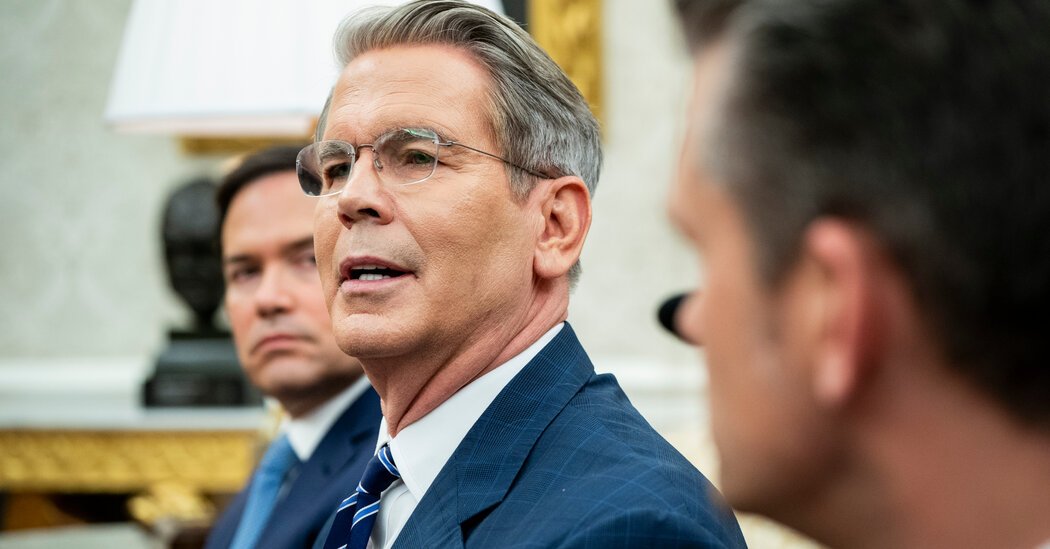Tariffs
Advertisement
Supported by
The Treasury secretary said that the President Trump and Xi Jinping of China have a good relationship but that he was not aware of a call, which Mr. Trump had alluded to last week.
Alan Rappeport and Jonathan Swan
Reporting from Washington
Treasury Secretary Scott Bessent said on Sunday that he did not know if President Trump had spoken to President Xi Jinping of China, casting further doubt on Mr. Trump’s recent suggestion that Mr. Xi had called him.
Mr. Bessent’s comments, made on ABC’s “This Week,” come as the United States and China are locked in a trade war that is destabilizing the world economy and rattling global markets. The secretary attempted to ease concerns about trade tensions with China and other countries, insisting that the administration was in talks with various nations and acknowledging that the tariffs it has imposed on Chinese goods were not sustainable.
But it appears that communication with China has been minimal.
“I don’t know if President Trump has spoken with President Xi,” Mr. Bessent said when pressed by the host, Martha Raddatz, about Mr. Trump’s statements that the two leaders had spoken about trade. “I know they have a very good relationship and a lot of respect for each other.”
The Treasury secretary is traditionally the American official who leads economic talks between the United States and China and would be expected to know if Mr. Trump and Mr. Xi had engaged in such discussions.
In an interview with Time last week, Mr. Trump said Mr. Xi had called him, though he declined to say when, and asserted that his team was in active talks with China on a trade deal.
Asked about the interview outside the White House on Friday, the president reiterated that he had spoken with the Chinese president “numerous times,” but he refused to answer when pressed on whether any call had happened after he imposed tariffs this month.
Beijing has denied that talks were underway. “China and the U.S. have not held consultations or negotiations on the issue of tariffs,” Guo Jiakun, the spokesman for China’s foreign ministry, said in a news conference on Friday. “The United States should not confuse the public.”
Mr. Bessent said in the interview Sunday that he interacted with his Chinese counterparts last week during the spring meetings of the International Monetary Fund and the World Bank but suggested that the conversations were “more on the traditional things like financial stability, global economic early warnings.”
Speaking to reporters on the sidelines of those meetings last week, Mr. Bessent dismissed speculation that Mr. Trump was considering unilaterally lowering the tariffs he has imposed on China before any negotiations with Mr. Xi. Mr. Bessent emphasized that any moves to de-escalate trade tensions must be mutual.
“I don’t think either side believes that the current tariff levels are sustainable,” he said at the time. The secretary added, “This is the equivalent of an embargo, and a break between the two countries on trade does not suit anyone’s interest.”
The U.S. tariffs on China have already begun to bite American importers. The pain is expected to intensify this week when a loophole that allows retailers to send clothes and other goods from China directly to American shoppers without paying tariffs expires on Friday.
Alan Rappeport is an economic policy reporter for The Times, based in Washington. He covers the Treasury Department and writes about taxes, trade and fiscal matters.
Jonathan Swan is a White House reporter for The Times, covering the administration of Donald J. Trump.
China Refuses to Take the Bait: The Trump administration has been saying that the two countries are engaged in talks to resolve the dispute, but Beijing asserts that no such discussions are happening.
‘No Buy’ Movement: The uncertainty surrounding President Trump’s tariffs has invigorated an underconsumption movement that took off early on TikTok and other platforms.
12 States Sue: The lawsuit, filed by Democratic attorneys general, said the president’s tariffs have hurt their economies and residents. Read the lawsuit.
Seeking Trade Deals: The president’s threats of tariffs have brought countries like Japan, South Korea and India rushing to negotiate, but they have sown chaos with bigger trading partners like China.
An Army of Robots: China’s secret weapon in the trade war is an army of factory robots, powered by artificial intelligence, that have revolutionized manufacturing.
Advertisement
Bessent Demurs on Trump’s Claim of Trade Talks With China’s Xi – The New York Times



